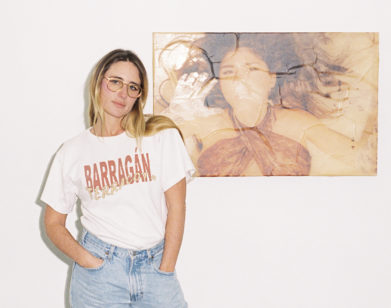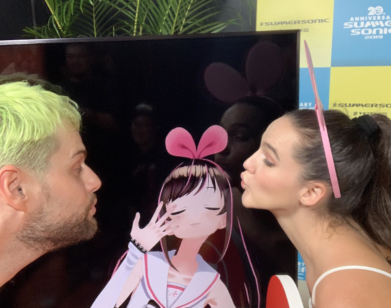How Russian DJ Nina Kraviz came to dominate the techno scene
The tale of how Russian techno DJ and producer Nina Kraviz came to bring down the house for hordes of blissed out fans at top festivals like Sonár in Barcelona and Dekmantel in Amsterdam is well worn, but never loses its luster.
Hailing from the riverside city of Irkutsk, Russia, Kraviz practiced as a dentist for cosmonauts in Moscow for years before she began spinning electronic music on the radio and playing club gigs. Today, she’s a legitimate icon, with adoring fans and an endless stream of international tour dates. Kraviz has at times delighted in bewildering techno-heads, who show up for one of her sets expecting something reminiscent of a 120 BPM kick drum and wind up on an esoteric journey wandering among moods and soundscapes for hours.
Her influences are Catholic to say the least, but one of her drugs of choice is acid; that is, the techno sub-genre known for squiggly, scientific sounds concocted from 1980s synthesizers. Speaking to this and her love of sonic adventures, Kraviz founded her own label in 2014, called трип, which translates to “Trip” and has signed acts including Bjarki and Roma Zuckerman to its roster. Interview caught up with her, at Destroyer, a cafe in Culver City, days after playing Lights Down Low, her first warehouse party in Los Angeles.
KEVIN MCGARRY: Are you based in Berlin now?
NINA KRAVIZ: Moscow. And then I just travel around. Iceland, Berlin, New York. My schedule doesn’t really allow me to stay anywhere longer than a certain amount of time. But it’s my little hobby to listen, because I’m very acoustic, I like to hear things. People perceive the world in different ways, some people are more visual, some people are smelling or hearing. I’m very sensitive to all kinds of sounds, especially when people speak I listen to the melody of their voices, how they speak. I’m really fascinated by languages especially. America is such an amazing country in so many ways because people are speaking one language but they speak it in very different ways, the essence is very different, it’s fascinating to catch the little differences. So let me give it a little try. You’re not from here, right?
MCGARRY: I’m not from here.
KRAVIZ: In my experience, people from New York speak like that but also, you’re not 100 percent a New York speaking person. There’s something in there I don’t recognize; when I meet people that are really born and raised in New York, they speak a bit different. Your melody is different. So, let’s figure this out, where do you come from?
MCGARRY: You have a good ear! I’ve lived here for seven years, but before that I lived in New York for ten years and before that I lived in a tiny village between Boston and Montreal. You hear my country hick kind of thing. Do you speak many languages?
KRAVIZ: I speak little snippets of languages. I make an impression, I’m really good at making impressions, good or bad.
MCGARRY: It’s cool though, because you’re kind of working in a medium that is all about communication, but its not limited to language. You’re representing symbolically as someone who’s Russian and from Berlin; do you think about this kind of exchange that’s happening?
KRAVIZ: All the time. I have a very strong identity, about everything I think. I’m a very opinionated person but my opinions can change and I’m very flexible depending on the outcome and the source of the information. But I recently found out that there is an actual term for something that I do. It’s called glocalism [thinking globally, acting locally].
MCGARRY: Yeah. Édouard Glissant.
KRAVIZ: I am a total Glissant glocalist. And on top of that I don’t think I am 100 percent a glocalist, but a glocalist that is immersed in this continuing of cultural flows between generations, between countries and historical backgrounds. I feel the air differently, I start to mimic a little bit, and I start to adjust to a different pace each country I visit, and I am genuinely interested in everything that is happening. As soon as there is the word “trip” or we’re going somewhere I’m like: [perks up].
Glocalism is an incredibly interesting thing, because every time I go somewhere I represent my culture globally and I also play with being immersed into the local thing. [This] gives me pleasure and tranquility, where you feel in harmony with everything. You’re a part of the flow that surrounds you. You are moving together, you’re part of this big ocean or system.
MCGARRY: That’s an ideal?
KRAVIZ: That’s what makes me feel most comfortable. And when I feel the most balance. You know, when I was performing in L.A. I was really feeling bad, I had a migraine and wouldn’t go out for days. And then I went to the club and something just clicks and you gain the energy back. And then every record is just like psh, psh, psh, subconsciously it’s happening.
The crowd wants to be directed, guided, and you have to be some kind of leader. You have to orchestrate what’s happening. The successful show, in the majority of cases, depends on my own comfort and how I am able to open up.
Sometimes it’s crazy, it’s the worst situation ever when you play and don’t feel anything, it doesn’t go through you. You tune everything correctly, the technical situation is good, the people are great, but you don’t feel like it’s going through you, you know? To breathe with the music, this is very important. And so when it happens I feel very guilty.
MCGARRY: Oh no!
KRAVIZ: In all these situations, if something doesn’t go right I always blame myself for it. I always take responsibility for it. Because, I travel to a lot of different places and people spend [money on] an entry ticket, you can feel it, it’s one week for them. In some places, people work a lot to get this ticket, they wouldn’t be able to afford it but they just do it. So I also always think about it, take it into consideration that it’s good to put in some effort. It’s not like I have to entertain, I don’t put that kind of pressure on myself, but I acknowledge that sometimes it’s difficult for people to get money for tickets. And they just [come to my shows] because they really want to see me, or they want to feel good and they want to feel different, because they work a lot, and so long and they want a celebration of life. It’s great when you give it to them and when I just don’t feel like I’m giving it to them, sometimes people say “It was a great show,” but there’s always this little critique in me that says “I don’t know.” There’s this little voice telling me something was not right, you didn’t give 100 percent.
MCGARRY: People say if you worry you’re losing your mind it’s a sign that you’re not, because of the self-awareness. That kind of openness relates to the kind of intimacy and the kind of comfort you’re talking about establishing, because it’s so crazy to create intimacy for a crowd of 50,000 people or how to calibrate it from that to smaller—
KRAVIZ: Oh you would be surprised.
MCGARRY: Is it easier?
KRAVIZ: I actually don’t think intimacy depends on a lot of people, if you can believe it. It’s like with money. It’s a universal term: money is money. When you think about intimacy, it’s the same. When you really feel intimate, it doesn’t matter how many people are in front of you. But probably you just play music differently, the same records but in a different way. I’ve felt extremely intimate moments in front of really a whole lot of people, and sometimes I feel extremely distant.
When you are in front of a big stage in front of a big amount of people, you don’t see their faces that well. You sometimes peek a few people, but mostly you just focus, and try to translate some kind of an emotion. I feel naked sometimes, even though there’s thousands of people and they feel you so well. I was crying a few times just because of the intensity. It has nothing to do with how many hands up in the air [there are], has nothing to do crazy crowds, it can just be cerebrally grooving with you, but it’s still very intimate. Sometimes you can be feeling comfortable with somebody that you don’t know at all, rather than somebody that sleeps in your bed every night. It doesn’t matter how many people are there [in a crowd]; you either feel comfortable or not.
I had this show in Austin. The crowd was really mixed, literally mixed. Racially, sexually, socially—it was so good. For two, three hours you feel this unity that you wish would continue, and everything would be as unified as it was just a few hours ago and people would be accepting each other. [We could] just be circling in this swirl of joy. You feel like you just love people, you know? It’s this incredible feeling where you don’t judge anybody and you accept everything, it feels like you’re one. When it happens, when this sync moment occurs, it’s one of the most amazing miracles you can have as an artist.
NINA KRAVIZ’ REMIX FOR MOUNT KIMBIE’S “BLUE TRAIN LINES” [WARP RECORDS] WILL BE RELEASED MAY 4, 2018.







